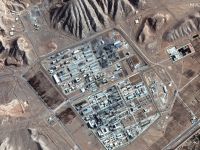It was not certain whether a deal to end the controversy over Iran's nuclear program could be reached on Monday, Iranian Deputy Foreign Minister Abbas Araghchi said in Vienna.
"There are still problems we have to overcome. ... I cannot promise whether they will be solved today or tomorrow," he said on the 17th day of talks between Iran and the group of Britain, China, France, Russia, the United States and Germany.
Araghchi's message was less optimistic than that of his Foreign Minister, Mohammad Javad Zarif, who told reporters the previous day that negotiations would not have to be extended past Monday.
Chinese Foreign Minister Wang Yi stressed that "there should be no further delay," when he arrived to join his counterparts for the last stretch of the marathon talks in Vienna.
Iran, the five permanent UN Security Council members and Germany already agreed in early April on the outlines of the deal that would effectively block any Iranian attempts to build nuclear weapons, by scaling down its civilian nuclear programme and placing it under close inspections.
Sanctions targeting Iran's economy, arms sector and nuclear industry would be phased out in return.
Since April, and during the current round of talks in Vienna, negotiators have been haggling over the exact sequence and timing of the nuclear and sanctions steps.
Tehran's leaders deny that they have ever sought to use their nuclear technology to build weapons, even though they are ready to accept nuclear curbs.
The sextet's concerns about Iran's military aims were fuelled by intelligence reports pointing to secret past nuclear weapons research projects.

Al Bawaba







